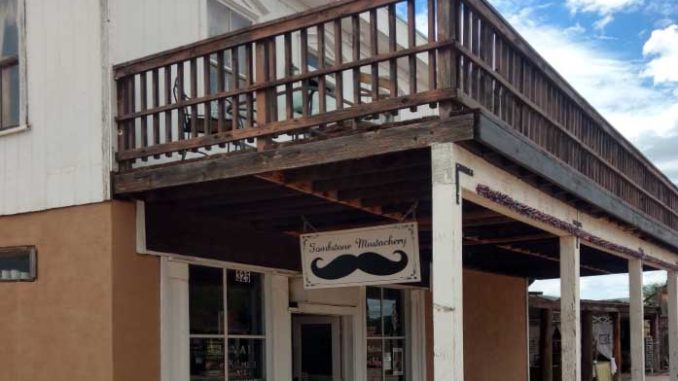
A Tombstone business that is leasing a high-trafficked property on historic Allen Street is safe from eviction for at least a few more weeks after a judge announced last week that he will accept additional written arguments on whether it’s time to void a court order that prevents the landlord from forcing the tenant out as long as the rent is paid on time.
Kevin and Sherry Rudd own and operate Tombstone Mustachery located across from the O.K. Corral. They were given notice in September 2019 that their landlords -Scott Clay and his sister Denise Clay-Vaishville- intended to termination the Rudds’ lease due to non-payment.
The Rudds had moved into the building in early 2018 as part of a rent-to-buy agreement with the Clays. The deal called for the Rudds to finalize the nearly $400,000 purchase by April 2019, but the deal fell apart when they couldn’t secure bank financing.
Court records show the parties then entered into a month-to-month lease, which the Clays attempted to end. Their action triggered a breach of contract and consumer fraud lawsuit by the Rudds who allege the sellers did not divulge information about the existence of a hydraulic vehicle lift under a loading dock area.
The property, which encompasses five city lots on historic Allen Street, operated decades ago as a gas service station, one of several uses over the years.
The Rudds contend the lift was discovered in May 2019 as they continued to pursue financing that was hampered by the fact gasoline tanks were removed from the site in the 1970s. The Clays, however, argue the lift is irrelevant because it remained hidden from everyone until September 2019, long after the purchase deadline.
The lawsuit also led Judge David Thorn of the Cochise County Superior Court to grant the Rudds a temporary restraining order (TRO) in October that blocks any eviction action on the condition the monthly $1,900 rent is paid. The TRO also prevents the Clays from selling the property to anyone else until the lawsuit is resolved.
The Clays filed a breach of contract counterclaim in December seeking $8,100 for unpaid rents accrued prior to the TRO.
On July 23, the parties appeared before Thorn for a hearing on whether the Clays can finally move forward with evicting the Rudds and their business from the property. The hearing was prompted by a motion for summary judgment filed by Andrew Carlson, the Clays’ attorney.
The motion is a way for the Clays to get the lawsuit dismissed without waiting for a jury to hear the case several months from now. However, it requires a finding by Thorn that there are no material facts in dispute and that the Rudds have failed to support their claims.
The judge granted Carlson until July 31 to file witness affidavits on behalf of the Clays. The Rudds will have until Aug. 14 to file their final response. Thorn will then rule on the matter from chambers or order another hearing.
The judge’s decision will likely hinge on who knew what about the lift, and when they knew it in relation to the purchase agreement and the Rudds’ April 2019 deadline.
If Thorn denies the motion for summary judgment then the matter will be set for trial. Due to COVID-19 protocols at the courthouse the trial probably not happen until next year.
However, if the judge grants the Clays’ motion, then he must decide when the eviction process can start. He will also decide whether the Rudds have to pay last year’s unpaid rents as well as $15,000 for the Clays’ legal costs.

